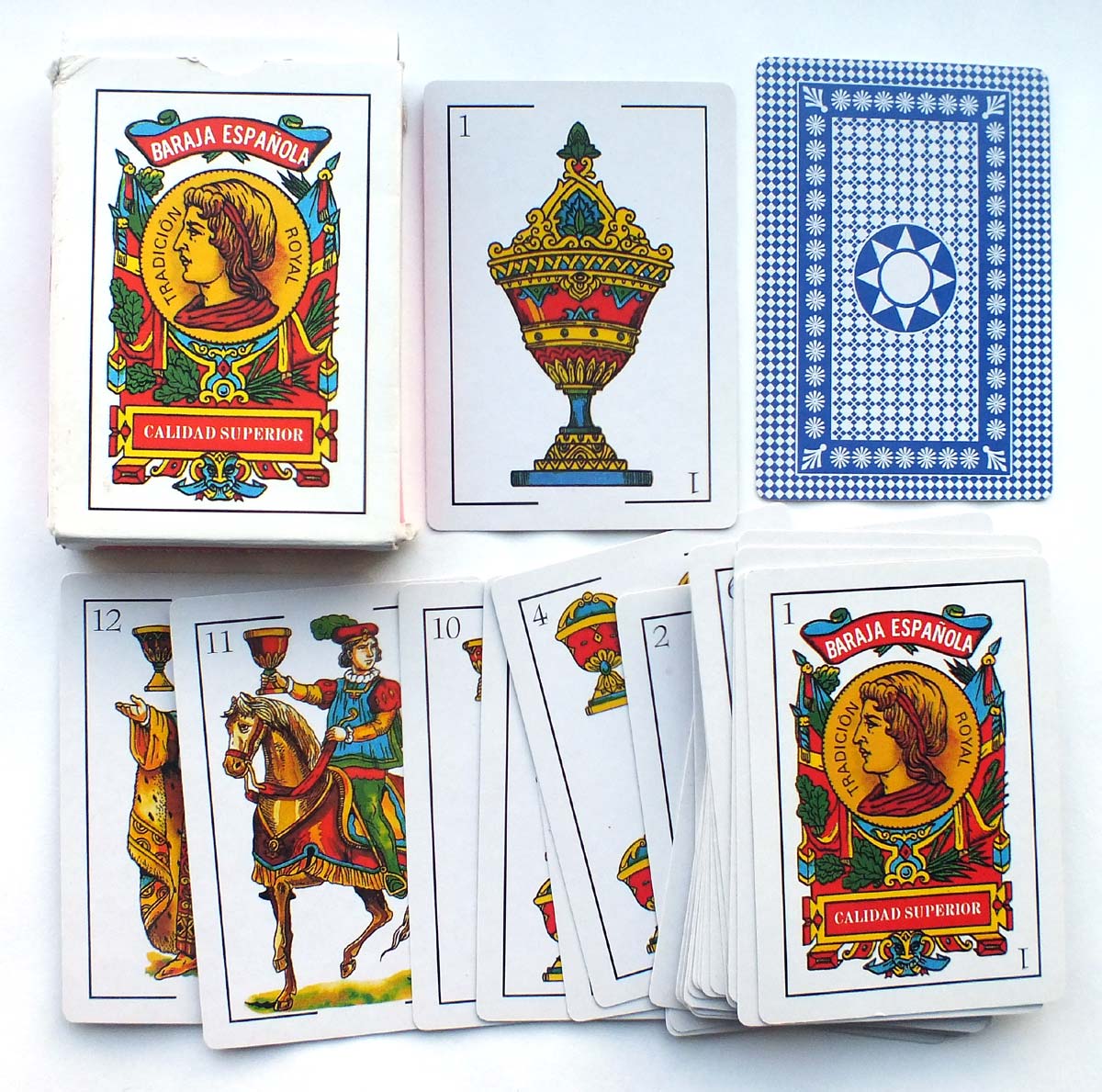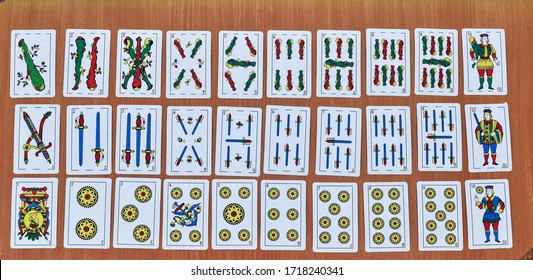The Spanish Deck, otherwise known as the Baraja Española, can consist of 48 cards divided into 4 palos (suits). The suits are Copas (Cups/Hearts), Oros (Coins/Diamonds), Bastos (Clubs) and Espadas (Swords/Spades). | However this deck is usually cut down to a 40 card deck by removing the eights and the nines (if it is not already sold as a 40 card deck). This is the deck that is most used for games and fortune-telling purposes. These cards, or naipes, are numbered from As (Ace) to 7, then 10 to 12. Card 10 is also known as the Sota (Jack), Card 11 as the Caballo (Knight) and Card 12 as the Rey (King). If you need a quick answer to your question, you simply need to draw one card. A single card can give an overall impression about your problem. If necessary, you can draw an additional card to clarify the first card. In addition, this method is suitable for finding out how your day is going to go. For example, drawing a Hearts card means that issues to do with emotions and the home are going to be important that day, drawing a Diamonds card means that issues to do with hard work and affairs outside the home will be important, drawing a Clubs card means that issues to do with business and money will important, and drawing a Spades card indicates problems and difficulties will be important. Naturally of course, spreads which include more cards give a a far more detailed reading.
The Spreads Three Card Spread: This spread gives a quick answer/overview to a single question/issue. Lay out three cards in a row from left to right. |
1 2 3The cards represent past (card 1), present (card 2) and future (card 3). This spread can also be extended to a Nine Card Spread using three cards for the past (top row), three cards for the present (middle row) and three cards for the future (bottom row). 1 2 3 4 5 6 7 8 9 The Horseshoe Spread: This spread gives a more general overview of your life and uses 21 cards. Lay down seven groups of three cards in the shape of a horseshoe or arch. Each group covers a category.
The seven categories are:
1 The past situation.
2 The present situation.
3 Developments in the near future.
4 What you don't expect.
5 People around you.
6 Obstacles and opposition.
7 The outcome.
The Gypsy Spread: From left to right, lay three rows of seven cards. The top row of seven cards represents the past. The middle row the present and the bottom row of seven cards the future. This 21 card spread demands great skill and is not to be attempted until you are very confident with the meanings of the cards and combining them into a meaningful narrative.
The Meanings of the Cards Copas Ace (As/La Copeta): The house and the home. Stability. Consolidation. The present and current events. Something from the past which is re-emerging.
Two (Dos): Lover or friend. Friendship. A relative.
Three (Tres): Pleasant surprise. Relationship or partnership between two people. Engagement or marriage proposal. Happy event.
Four (Cuatro): Conversations. Reach an agreement. Good comments.
Five (Cinco): Jealousy around you. Malice from someone. Greed.
Six (Seis): Love. Start of a love affair. Passion.
Seven (Siete): Joy. Happy events. Things work out well despite bad beginnings. Things work out after being at a standstill.
Ten (Sota): Dark-haired woman witha light complexion. Housewife. Mother. Good female friend. Artist.
Eleven (Caballo): Unstable person. Well-known man. Manufacturer. Womaniser.
Twelve (Rey): Dark-haired man with a light complexion. Intelligent responsible and serious man. Capable. Oros Ace (As/El Or�): Triumph. Success. Letter, phone call, email, fax. News.
Two (Dos): Obstacles, difficulties, postponements, delays.
Three (Tres): A short journey. Exit. Short trip. Visiting or visitors.
Four (Cuatro): Present or gift. Small amount of money. A small loan.
Five (Cinco): The workplace. A meeting place. Assembly or meeting. Hotel. Hospital. Large building.
Six (Seis): Night. Negligence. Trivialities. Small problems.
Seven (Siete): A lot of money. Successful business. A deal with a rival. Gains.Small prosperity. Good health. A rise in luck. Things start to move after delays.
Ten (Sota): Blonde or grey-haired woman. Professional woman. Medical woman or lawyer. Nun. Businesswoman. A rich woman.
Eleven (Caballo) : Traveller. Somebody from afar. Good friend. Intelligent, confident man. The matter at hand.
Twelve (Rey): Blond or grey-haired man. Professional man. Medical man or lawyer. Priest. Businessman. A rich man.
Bastos Ace (As/El Bastillo): Deceit. Lies. Bad faith. Intrigue. Death.
Two (Dos): A child. Ideas. Projects. Plans. Hopes.
Three (Tres): Magic. Packages. Suitcases. Workplace. Religion.
Four (Cuatro): Setbacks and disaster. Small misfortune. Discovery. Something unexpected.
Five (Cinco): Jealousy. Deception. Troubled times. Something illegal or dishonest. Corruption.
Six (Seis): Long or short voyage. General changes.
Seven (Siete): The countryside or the seaside. Small city or town. Agricultural matters.
Ten (Sota): Dark-complexioned/olive-skinned, dark-haired woman. Divorced woman. Responsible, educated woman.
Eleven (Caballo) : Spirituality. Somebody far away. An acquaintance who is not often seen.
Twelve (Rey): Dark-complexioned/olive-skinned, dark-haired man. Divorced man. Responsible, educated man. Espadas 
Ace (As/La Espadilla): Total security. No room for doubt. The law. Justice. Victory.
Two (Dos): Legal documents. Inheritance. The formalities. Studies or apprenticeships. Documents.
Three (Tres): On the way. Leaving someone or something. Divorce. The end. Resolution.
Four (Cuatro): Laid up in bed. Small suffering. Someone or something nearby.
Five (Cinco): Loss. Harm. Difficulties. Intrigue. Swindling. Robbery. Theft. Malice.
Six (Seis): Worries. Anxieties. Insecurity. Nervousness. Doubts. Obsession. Insanity. Instability. Anguish.
Seven (Siete): Sorrow. Tears. Chagrin. Heartache. Anger. Arguments. Lawsuit. Dispute. Disagreements. Opposition.
Ten (Sota): Very dark-haired woman. Divorced woman. Strong-willed and determined woman. Sister or female relative.
Eleven (Caballo): Sociable man. Drinker. Husband. Visitor. The matter at hand.
Twelve (Rey): Very dark-haired man. Divorced man. Strong-willed or determined man. Brother or male relative.
The Meanings of the Extra Cards Copas Eight (Ocho): A journey to visit friends. A visit.
Nine (Nueve): The wish card. All will turn out well. Oros Eight (Ocho): Travelling for business or money purposes. A work conference.
Nine (Nueve): Wealth gained from business dealings. Bastos Eight (Ocho): Money gained as a loan.
Nine (Nueve): A new job or a promotion. Espadas Eight (Ocho): A journey which which either brings bad luck or is a consequence of bad luck. Deception.
Nine (Nueve): Bad luck and misfortune.
| 




